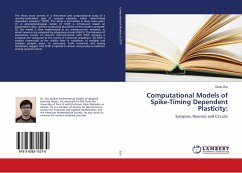
Computational Models of Spike-Timing Dependent Plasticity:
Synapses, Neurons and Circuits
Versandkostenfrei!
Versandfertig in 6-10 Tagen
45,99 €
inkl. MwSt.

PAYBACK Punkte
23 °P sammeln!
This thesis work consists in a theoretical and computational study of a recently-indentified type of synaptic plasticity, called "spike-timing dependent plasticity" (STDP). The thesis is articulated in three main parts. (1) A phenomenological model of STDP is introduced based on experimental data, and the biophysical plausibility of this model is analyzed. (2) This model is then implemented in an analog-neuron simulator, in which neurons are emulated by integrated circuits (ASICs). The behavior of elementary circuits of neurons interconnected with STDP synapses is analyzed and compared to the ...
This thesis work consists in a theoretical and computational study of a recently-indentified type of synaptic plasticity, called "spike-timing dependent plasticity" (STDP). The thesis is articulated in three main parts. (1) A phenomenological model of STDP is introduced based on experimental data, and the biophysical plausibility of this model is analyzed. (2) This model is then implemented in an analog-neuron simulator, in which neurons are emulated by integrated circuits (ASICs). The behavior of elementary circuits of neurons interconnected with STDP synapses is analyzed and compared to the results of numerical simulations. (3) STDP is studied numerically at the cellular level in conditions of multiple and complex synaptic input. In conclusion, both numerical and analog simulations suggest that STDP is optimal to detect and process correlations among synaptic inputs.












